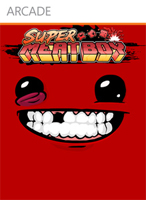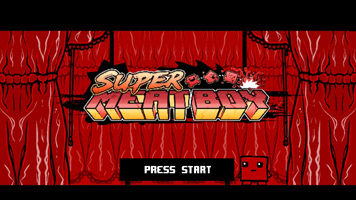

developed by Team Meat [= Edmund McMillen (Santa Cruz, CA) & Tommy Refenes (Asheville, NC)]
first published October 20, 2010, for Xbox 360, 1200 MP (Microsoft Points) (=$15)
PC version first published November 30, 2010, for Windows, $14.99
[“90’s commercial”, trailer]
[website]
~260MB
Played to completion of the core game (the “light world”) in 9.5 hours, 3/29/15–4/4/15.
Fifth of the seven games in “Humble Indie Bundle 4″ purchased on Tuesday, December 13, 2011.
Broomlet has backlog! Backlog. Four backlog. Gotta get through all this stuff and not make such a big deal about it. This is a perfect opportunity to take another stab at being brief and only writing what it occurs to me to write.
Once again, I only took one note on my playing experience: “There’s no such thing as ‘hard.'”
What does this mean? Yoda will explain.
Super Meat Boy is all about ‘hard,’ but what if there’s no such thing as ‘hard’? Super Meat Boy is actually all about learning. “Learn to do this thing. It might take you a while. Okay, now you can. There, you did it.” Repeat. At the end of each level, once you’ve learned to execute whatever it requires, it puts on a victory show of all your prior attempts played simultaneously: here’s what learning looked like.
I liked this about it. I liked knowing that each failed attempt was seen not an occasion for shame but as one more tick mark toward my inevitable victory replay. This was what the game was designed to expect: a final tally containing many many failures and only one success. I felt my efforts, whatever their results, were welcomed. I felt included.
And yet the game really believes itself to be about ‘hard,’ and that’s a cult I don’t belong to. Why, after all, were these the things I was supposed to learn to do? Why so many spinning saws slicing my bloody meat? If you want the psychoanalysis of this game, just watch Indie Game: The Movie, because it’s all laid out very clearly. Meat Boy sloshes blood everywhere because his woundedness is a point of pride. “He’s a survivor,” as the saying goes. But that’s not a saying I ever use. I’m here to have dreams and have fun. Was this fun?
Of Hammerfight I said that the tininess of all the stuff in the game felt like a deep psychological proclivity, a kind of aesthetic micropsia, and here we have the platformer equivalent. I think this started with the notorious I Wanna Be The Guy, which is obviously a joke game, but a joke with some teeth in it for the target audience: you are a tiny little crushable bug making your fragile way through an absurdly cruel world meant for normal-sized Nintendo characters.
The premise of Super Meat Boy is basically “What if I Wanna Be The Guy were actually fair?” (That’s like saying “What if we made a really fun prison?” — the proposal doesn’t make sense unless you’re in the right psychological pocket to begin with.) Here as there, instead of your character having the standard screen presence and weight of Mario or Mega Man or whoever, it’s more like you’re the ball in Pong: just a delicate speck that spends most of its time precariously zinging through empty space.
The crazy physics of platformers going back to Mario, wherein the trajectories and speeds of jumps can be altered at will in midair, have here been brought to such an extreme that it hardly feels like what’s going on is “jumping” at all. More like you’re pushing and dragging Meat Boy through the screenspace, subject to various obscure laws, one of which is sort of like gravity. Often I felt like what I was doing was more like freehand drawing than platforming — e.g. when you draw a circle in one sweeping motion and hope the ends meet up exactly. That’s very similar to the skill set, and sense of kinetics, at work in this game. To have such tininess and floatiness replace that good old thick, hearty Mario gravity (or even Jasper’s Journeys gravity) was strange, and never stopped feeling strange. It was like wearing someone else’s prescription. Both visually, and, as I’m saying, spiritually.
Once again, I certainly had no use for all the blood and poop and fetuses, but I get whose company I’m in and where it comes from so I’m not going to dwell on it.
The above is all just mixed feelings. My creed is that level design is where games live or die, and the level design is good, well graded, mostly unrepetitive, mostly stimulating. So, really, all’s well. I can understand why this game was a huge hit: it’s thoroughly attentive to detail. If there’s something in the game, it’s there with intention and care. That goes a long long way toward earning my goodwill, even when I don’t feel like I’m the target audience. This game knows what it’s about.
Here’s the one and only thing about Super Meat Boy to which I firmly object: those damn completion percentages.
I finished less than half of the content in the game, and yet I saw the end of the story, I saw the credits, I “beat the final boss.” But there are — hidden away in various cute ways I needn’t go into — more than 200 other levels, plus 100-some additional challenge items to try to collect, etc. etc. I think that’s all great: you finish the game, you want more? you’re in luck: it keeps on going and going. But for that magical sense of extra-ness and bonus-ness to apply, the game needs to be very explicit about how extra and bonus it all is. Like a store that has all its items on ‘discount’ all of the time — you only get to elicit that good “ooh, a discount!” feeling if you never ever waver from your claim that the higher price is the real official price. Super Meat Boy stupidly gets overexcited about its bonus content and crosses its own line, by announcing at the top of each level-select screen: “COMPLETE: 29%”.
That’s the number it showed me for “Chapter Two” after I had finished that chapter to the story’s satisfaction, beaten the boss and moved on to Chapter Three: 29%. How pointlessly demoralizing! Instead of being able to be pleased with my progress (as encouraged by, among other things, the game’s own narrative), I am forced to be aware of how I stack up against an obsessive completionist standard. This is like a “hardcore gamer” snob sticking his nose in before I’ve even finished playing the basic levels: “Yeah, you think you’re playing, but you’re really only 29%ing, newb.” Dude, you’re not impressing me, and this is my house! Leave me alone.
That percentage can exist on some stats screen, for the compulsive types that want it, but please hide it away from me. I should get to say what constitutes 100%. Or make the highest achievable amount be, say, 500%. By default, 100% should be the end of the game.
Basically, this is just another case of game designers forgetting the difference between OCD about games and games themselves. It’s a very important difference, and one that affects people’s lives. It’s an ethical issue! Don’t bring the OCD to us; we’ll bring it to you!
Of the game’s Chapter Six, the dedicated Super Meat Boy Wiki says, and I quote (sic): “The main diffuculty is that the levels are significantly more time consuming, so death is less of a slap on a risk.” The whole internet can be like wearing someone else’s prescription.
You can watch the documentary to get a clear sense of where this game came from. The credits are:
Edmund McMillen: art, design
Tommy Refenes: code, design
Danny Baranowsky: musical score
Jordan Fehr: sound effects